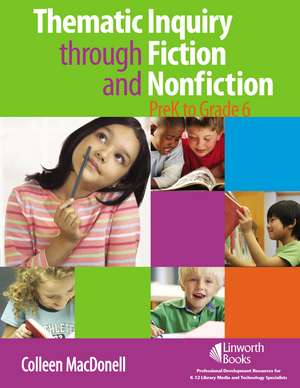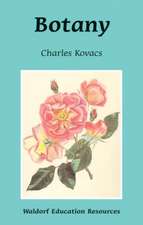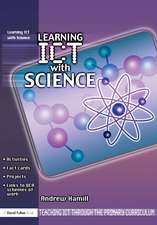Thematic Inquiry through Fiction and Non-Fiction - PreK to Grade 6
Autor Colleen MacDonellen Limba Engleză Paperback – 26 ian 2009 – vârsta până la 17 ani
Preț: 237.34 lei
Preț vechi: 305.57 lei
-22% Nou
Puncte Express: 356
Preț estimativ în valută:
45.43€ • 49.36$ • 38.19£
45.43€ • 49.36$ • 38.19£
Carte tipărită la comandă
Livrare economică 21 aprilie-05 mai
Preluare comenzi: 021 569.72.76
Specificații
ISBN-13: 9781586833503
ISBN-10: 1586833502
Pagini: 136
Dimensiuni: 216 x 279 x 10 mm
Greutate: 0.34 kg
Editura: Bloomsbury Publishing
Colecția Linworth
Locul publicării:New York, United States
ISBN-10: 1586833502
Pagini: 136
Dimensiuni: 216 x 279 x 10 mm
Greutate: 0.34 kg
Editura: Bloomsbury Publishing
Colecția Linworth
Locul publicării:New York, United States
Notă biografică
Colleen MacDonell is the learning resources coordinator for a pre-K to grade 12 international school.
Recenzii
This guide for teachers, librarians, and literacy coaches focuses on inquiry-based learning and details how fiction and nonfiction books can be integrated into thematic inquiry in preschool and elementary classrooms. MacDonnell, a library coordinator, provides 16 units that each outline sample questions, vocabulary, hands-on activities, and connected national standards. She gives background on inquiry-based learning and how it works, followed by the units on personal well- being, products people make and use, community, and the natural environment. Each unit includes an annotated list of books to use.
This is an excellent guide for classroom teachers and school media specialists interested in adding inquiry-based collaborative lessons to their repertoire. . . . This guide will provide fresh ideas to those already comfortable with inquiry and a solid jumping off point for those beginning inquiry for the first time. The book will be a welcome addition to any elementary library's professional collection. Recommended.
The book contains some truly in-depth learning ideas.
Thematic Inquiry through Fiction and Nonfiction, PreK to Grade 6 is a guide for educators and librarians for giving inquiry-based lessons to children in preschool and elementary classes. Each thematic inquiry unit is divided into a 'Read it!' section wtih a sample dialogic reading of a given fiction or nonfiction book, an 'Integrate it!' section with examples of how specific subjects or technology can be seamlessly blended into the lesson, a "Do it!" section with hands-on activities, and an 'Assess it!' section with solid cross-curriculum standards and goals. Lists of core collection fiction and nonfiction books suitable for the lesson plans are included, and librarians and teachers are given the right to reproduce activity sheets for library or classroom use. Thematic Inquiry through Fiction and Nonfiction, PreK to Grade 6 is ultimately a solid guide and supplement to stimulating intellectual curiosity and creative thinking. 'The challenge for schools with a rigidly definied core curriculum is to interpret the core content in such a way that it connects to the real list interests and questions of students. The challenge for more open curricula is to find motivating questions with enough content to sustain interest neither frivolous nor abstract teachers and children should be able to frame contect into questions that are worthy of in-depth investigation and thought.'
This is an excellent guide for classroom teachers and school media specialists interested in adding inquiry-based collaborative lessons to their repertoire. . . . This guide will provide fresh ideas to those already comfortable with inquiry and a solid jumping off point for those beginning inquiry for the first time. The book will be a welcome addition to any elementary library's professional collection. Recommended.
The book contains some truly in-depth learning ideas.
Thematic Inquiry through Fiction and Nonfiction, PreK to Grade 6 is a guide for educators and librarians for giving inquiry-based lessons to children in preschool and elementary classes. Each thematic inquiry unit is divided into a 'Read it!' section wtih a sample dialogic reading of a given fiction or nonfiction book, an 'Integrate it!' section with examples of how specific subjects or technology can be seamlessly blended into the lesson, a "Do it!" section with hands-on activities, and an 'Assess it!' section with solid cross-curriculum standards and goals. Lists of core collection fiction and nonfiction books suitable for the lesson plans are included, and librarians and teachers are given the right to reproduce activity sheets for library or classroom use. Thematic Inquiry through Fiction and Nonfiction, PreK to Grade 6 is ultimately a solid guide and supplement to stimulating intellectual curiosity and creative thinking. 'The challenge for schools with a rigidly definied core curriculum is to interpret the core content in such a way that it connects to the real list interests and questions of students. The challenge for more open curricula is to find motivating questions with enough content to sustain interest neither frivolous nor abstract teachers and children should be able to frame contect into questions that are worthy of in-depth investigation and thought.'







